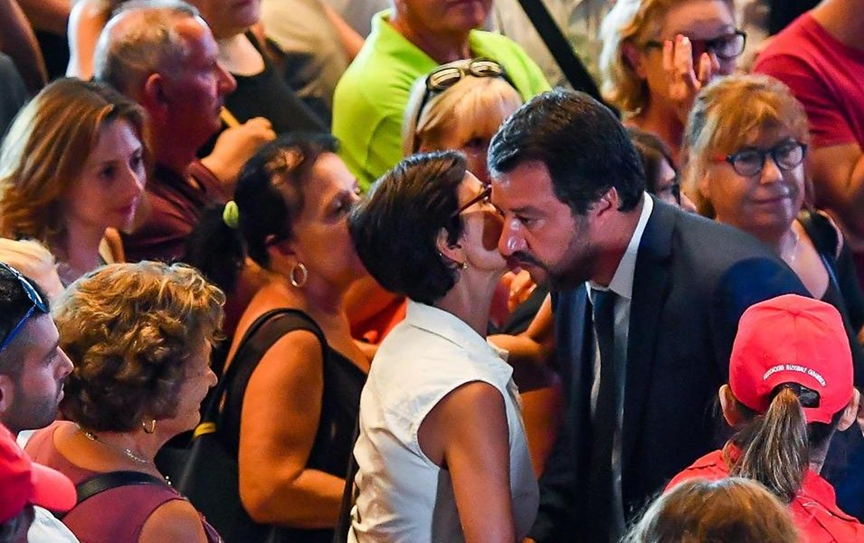 Mourners reach out to Italian Interior Minister Matteo Salvini at the state funeral in Genoa yesterday.
A state funeral was held in Genoa, Italy yesterday for 18 of the victims who died in the collapse Tuesday of a 656-foot section of the Morandi motorway bridge,
Mourners reach out to Italian Interior Minister Matteo Salvini at the state funeral in Genoa yesterday.
A state funeral was held in Genoa, Italy yesterday for 18 of the victims who died in the collapse Tuesday of a 656-foot section of the Morandi motorway bridge,
which is a main road in and out of Genoa, linking it to the A10 motorway and the road to France. Dozens of vehicles fell with the bridge, and the latest death
toll has reached 42. The tragedy has led to a fierce debate about Italy's infrastructure. The private company in charge of the Morandi motorway said it has set up
a fund worth millions of euros for the victims' families. The firm would also give money to help relocate hundreds of people who had to be moved out of their homes
after the bridge collapsed. Many families declined to take part in the state funeral.
Antonio Socci, who roots for the new Italian government, has this account.
In Genoa, the end of Italy's Second
Republic and the beginning of the Third
Translated from

August 19, 2018
There are moments in the history of a people which become symbolic events. For example, the funeral yesterday in Genoa for the victims of the Morandi bridge collapse demonstrated – beyond national sorrow - that Italy is turning a new page in its postwar history.
We saw what we had never before seen in the so many tragedies that have constellated the history of our nation. The two young cabinet ministers who represent the current government, Matteo Salvini and Luigi Di Maio, were greeted by thunderous applause, whereas the leaders of the political opposition were met with chilly disapproval broken by whistles and cries of “Get out!”, or “Enough of you!” or “Shame on you!” to the leaders of the Partito Democrata who are evidently considered symbols of previous governments in the past decade.
Usually, of course, government officials are greeted with protests and whistles because not uncommonly, government inefficiency, delays and mistakes have resulted in disasters. But it was the opposite yesterday.
It seems the people understand all too well what was happening in the past and what is happening now, and obviously approve of the actions taken by the new government.
One had not witnessed anything similar. Perhaps the only precedent was after the earthquake in Irpinia in 1980 when then President Pertini cried out “SHAME” in front of the TV cameras, because 48 hours after the earthquake, aid had not yet arrived. Both the media and the people applauded Pertini for this.
But Pertini as President was head of state, not head of government, and as such, he did not have the working responsibility for sending the aid teams, and could therefore protest as he did.
Yesterday in Genoa, it was the government itself – in the person of its two most representative ministers – who was applauded by the people for their work so far. Along with the firemen, the forces of law and order, of civilian protection and other local agencies which all came to the rescue after the bridge collapse. And the head of state, President Mattarella.
In recent days, some have tried to launch slogans ‘against the state’, perhaps hoping to titillate a generic rebellionism that might channel the anger of the people against the new government. But no one fell for it. Everyone in Genoa showed that they ‘know’ exactly how things are, and demonstrated this by their thunderous applause for Salvini and Di Maio.
Obviously, the ‘common folk' feel themselves understood by the new government leaders, recognize themselves in their words and actions, and perceive that the government truly wants to help them and has their wellbeing as their priority. They feel they speak the same language, which is not ‘politicese’.
They will even accept some mistakes probably due to inexperience or to the impetus for renewal, because they understand that their new leaders are truly trying to turn a new page.
But the applause they received should make Salvini and Di Maio feel just how great the expectation is of them – one that must not be disappointed. They have a historic task. And it may be that the tragic event of the bridge collapse could mark the true passage from the second to the third Italian Republic.
Because the political consequences could go far beyond the eventual revocation of the management of highways and bridges from private companies. Thew new government is reviewing the strategic choices made in the past 25 years, made in the name of ‘European austerity’ and privatization (which must be carefully reconsidered), which have enormously improverished the Italian people and has made the state incur enormous debt.
The new government will have to launch a great investment plan that will jumpstart the Italian economy from the stall it has had for the past many years.
Yet the newspapers will call the applause given to President Mattarella ‘composed and respectful’ (though he used unequivocal terms like “unacceptable tragedy” and a “rigorous determination of who was responsible for what”). And they will call the applause for Salvini and Di Maio the work of a paid claque of rabblerousers.
The old establishment is not resigned to its loss of power. But even in the PD, there are those who inveigh against the old order.
Like the Governor of Puglia, who said to the PD leadership:
“You have been set aside and are at a historical low. You have devastated everything. Remake the party into something neo-conservative that is immune to all the lobbies of the world, including the firm Autostrade per l’Italia, and stop busting the balls of those who have always worked well”.
Alfredo D’Attorre (ex PD) wrote: “That on the part of the ‘left’, their greatest preoccupation after the bridge collapse was the collapse of the stocks for Atlantia simply confirms that the left must change ‘everything’. And fast – if we do not wish the word ‘left’ to be unspeakable in Italy for the next 20 years”.